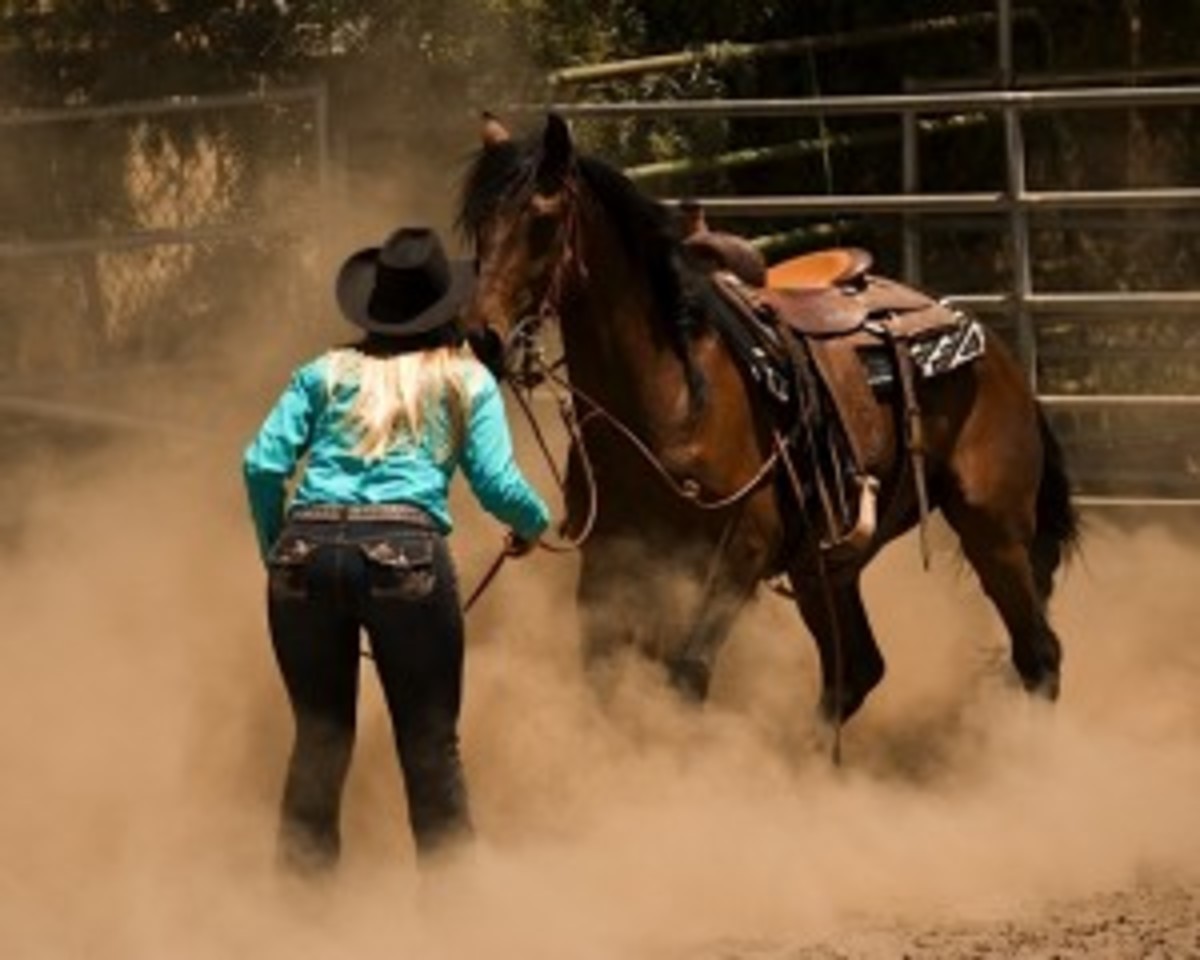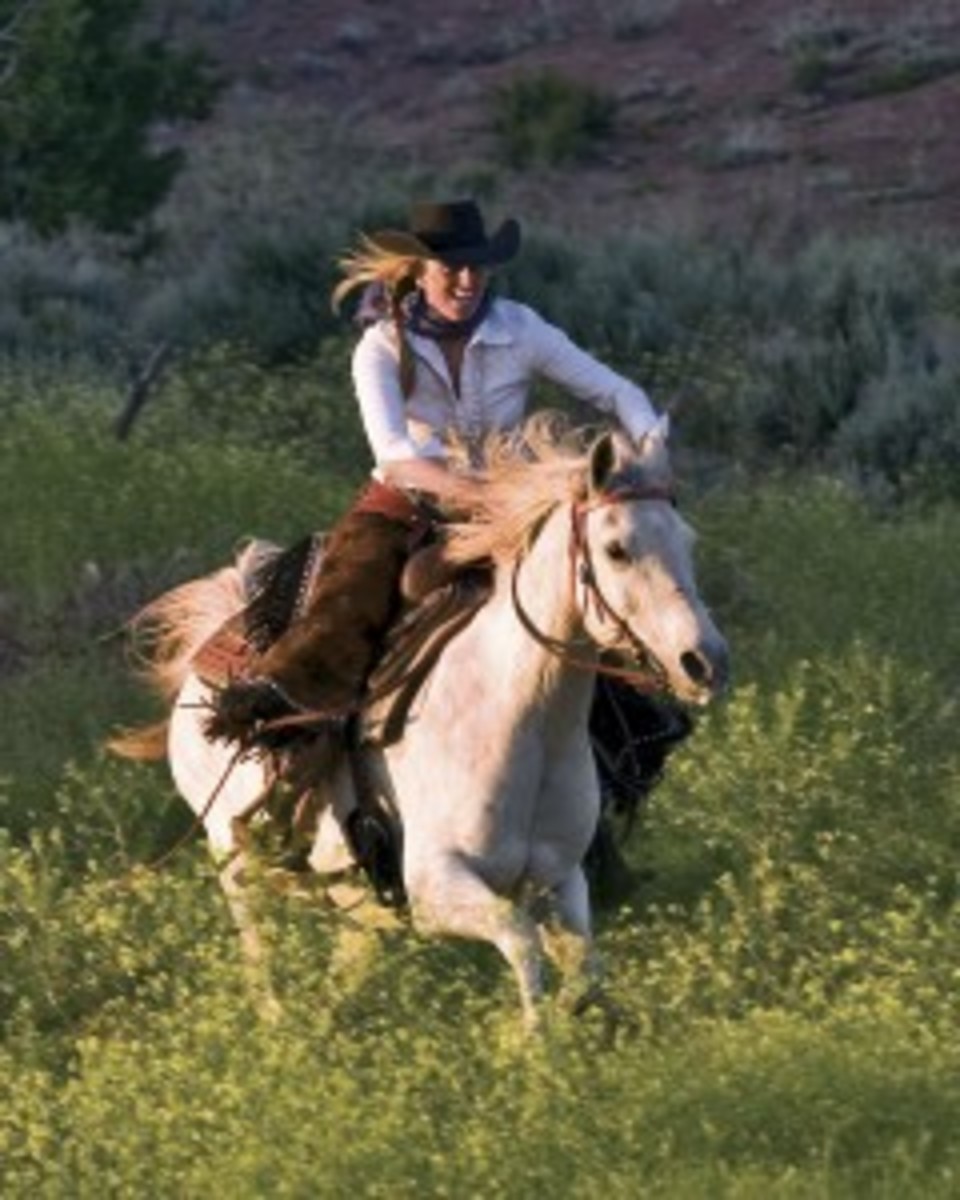Larger than life. Fun. Always smiling. Confident. Those who know Wylene Wilson of Southwest City, Missouri, use the same phrases over and over to describe her.

The mustang trainer who’s been dubbed “Extreme Wylene” has really impressed those who know her best. And it’s not just because she wins or places high in mustang-makeover competitions, nor because she’s featured in a movie about wild horses.
“Wylene’s got a big personality,” says trainer Al Dunning. “She’s really charismatic around people. She’s got a good presentation. She’s flamboyant and fun to be around. If you’re around her very long and you don’t smile or laugh, you’ve got a problem.”
She’s not just a pretty face and fun personality, either.
“She can ride,” says Patti Colbert, executive director at the Mustang Heritage Foundation. “To really ride a horse like she can?bridleless and saddleless?and to have the training skills and techniques, she just has a tremendous skill set.”
The Early Years
That skill set was something Wilson, now 33, learned at a young age. She and her sisters, Wenda and Wanette, were raised with horses.
“My mother was a horse trainer and riding instructor,” says Wilson. “She rode with Monte Foreman way back in the ’60s and learned quite a bit from him. She passed along all that knowledge and information to me when I was a child.”
Every weekend the sisters were at a horse show, rodeo, or gymkhana, and they were very competitive.
“Wylene and her sisters all barrel raced back when I was showing and my son, Grady, was young,” says Dunning. “We called them The Flying Wallendas (a reference to a family of daredevil stunt performers). They were barrel racing sons-of-a-gun and very handy on horseback.”
Wilson and her sisters competed on horses that wouldn’t have been considered the best of the best.
“Our horses weren’t ones we purchased,” says the cowgirl. “They were horses that were given to us, ones that nobody wanted, and we turned them into champions.”
Along with showing, Wilson was also used to riding a number of different, and often problematic, horses.
“I was always the crash-test dummy,” recalls Wilson. “My mom would say, ?Wylene, get over here and fix this horse for this person.’ I’d saddle it up, and it’d try to buck me off, run me into the fence, or whatever. So I learned how to handle horses and know what to do when something goes wrong.”
Knowing what to do is still something she teaches to this day, and she’s grateful to her mom, Janiece Wilson, for teaching her that.
Her Training Style
Wilson began training horses professionally when she was 17. Her mother was her biggest mentor, but she also had the opportunity to work with Dunning and other professionals such as Craig Cameron, Chris Cox, and Clinton Anderson.
“I always just wanted to be better,” says Wilson. “There wasn’t any wrong or right way for me to train. I just tried to take a little bit from each horseman and add it to my mix. Just like my mom, I was a student of the horse and wanted to be better.”
That desire and her confidence are what set her apart.
To reach all the goals that she’s accomplished with horses, Wilson credits her strong belief in herself, her horses, and her riders. “I’ve always had the attitude that there wasn’t a horse I couldn’t ride, handle, or teach,” says the cowgirl. “I want people to say, ?I know Wylene can ride this horse.’ Or, ?I can’t believe she did that; how did she do that?’ “I want to bring out the best in my horses and my riders.
So I try to reach in deep for that and just say, ?You can do this; I believe in you.’ You have to know that you’re capable of doing things.
“Horses are capable of doing things, too, but I find that a lot of people make excuses,” she shares. “When you actually scratch beneath the surface and get deeper, it always comes down to insecurity on the rider or handler’s part. The horse is fine and ready.”
Along with her can-do attitude, Wilson has a particular approach to training.
“I like to take a horse from wild to mild in the quickest, simplest, easiest, most humane method, from beginning to end,” she says.
The Process

The first step Wilson takes in that wild-to-mild transition whether the horse is a mustang or not is to lay the horse down. “I get them to lay down so that they learn patience, respect, and trust,” she shares. “Once I can get them on the ground, I touch them all over and let them know I’m not going to hurt them.” Julie Thompson of St. George, Utah, witnessed this process first-hand. “When she lays these horses down, it’s very powerful, and it’s a little strong,” Thompson says. “It’s not the old cowboy way, but it’s not touchy-feely either. It’s somewhere in between.”
Once the horse has been laid down, Wilson wastes no time and will immediately saddle that horse up.
“I get on him and try, as fast as I can, to get his feet moving, so that I can teach him,” Wilson says. “A horse can’t learn unless it’s moving. As soon as I know that I can ride a horse around, I ride him straight out. I take him up into the hills, out in the desert, down the street, or whatever. The fastest way to teach a horse is to get him out of a round pen so that he has to make decisions on his own.”
The next step in Wilson’s training program, particularly for mustangs, is to desensitize them to anything and everything. “I expose these horses to everything?trash bags, tarps, water, jumps, roping, and riding them bareback,” she says. “The more exposure I can get with them, the better.” This way of training has proven very successful for Wilson
as a mustang-makeover competitor. “She just has a way with those wild horses, getting them started really quick,” says Dunning. “Some people just have that and some don’t. She has it. She takes risks, but she’s really brave and courageous and has some good techniques that she uses that are pretty interesting.
“There’s no cookie-cutter deal for horse trainers out there, and there’s a niche for her,” he adds. “You shouldn’t cookie-cutter anything. You should find out what you’re good at and go for it, and that’s what she’s done.”
Her Clinics
Wilson shares her techniques with the public through her clinics. She does everything from confidence building and horsemanship to roping and jumping.
“It’s the most riding you’ll ever do,” warns Wilson. “You’ll ride your butt off, but it’s fun. We do a lot of fun exercises to encourage people to learn how to be out of their comfort zone. That’s the only way you get better if you do things you thought you’d never do.”
Along with her riding clinics, she also does a clinic strictly for horses.
“I do a full colt-starting clinic up in Utah, and it’s sold out every year,” the trainer says. “People bring their horses normally ones that aren’t handled or halter broke and they stay with me for seven to eight days. When the owners come back to pick up their horses, they’re ready to go.”
Marissa Rogers of Moreno Valley, California, is a friend of Wilson’s, and she’s assisted at colt-starting and confidence-building clinics.
“It’s like sending your horse to boot camp,” says Rogers. “The owners will bring them in on a Monday and pick them up on a Sunday, and they have completely different horses.”
Thompson’s seen this transformation in her own horse and many others.
“It never ceases to amaze me how she can take a horse I wouldn’t touch with a 10-foot pole, and she’ll take it and have that horse extremely usable,” says Thompson. “I’ve seen countless people in tears because of what Wylene can do for them and their relationship with their horse in such a short amount of time.”
Joy Bruce of Temecula, California, attended one of Wilson’s clinics and agrees with Thompson.
“What’s so powerful is Wylene’s belief in the horses’ ability to make good choices when they trust their rider,” says Bruce. “I’ve not seen this demonstrated so profoundly by other trainers. It’s what sets her apart.”
The Mustangs
That belief in the horse is crucial for training mustangs, too. “I never treat them like they’re wild mustangs?ever,” says Wilson. I treat them like they’re already champions, because I know they can be.” She elaborates that she knew the mustangs could be great, but that she never dreamed of how much they’d give back to her. She even states that if someone would’ve told her how important wild horses would be to her, she wouldn’t have believed her ears.
“But now, they’re all I want to ride, because they have so much grit and so much hardiness to them,” says Wilson.
“Once they trust you, they’ll do things that domestic horses could never dream of.”
She also encourages others to get involved with mustangs. For example, both Thompson and Rogers participated in makeover events after becoming friends with Wilson. Plus, both women finished in the top 10 at their very first events.
“If you’ve ever thought about working with a wild horse or doing the mustang makeover, do it,” says Wilson. “It will absolutely change and inspire you.”
To date, Wilson’s competed with eight different horses, and all have placed in the top 10. She’s won the event twice and was reserve once.
“What I love about the mustang makeover is that you’re not dealing with pedigrees or daddy’s money,” she says. “You’re not dealing with the politics. You actually have a horse that has no name, and it’s your job to take that animal and show how great he can do just by himself.”
Organizer Colbert agrees. “This wild horse levels the playing field. It doesn’t matter if you’re a world champion or not, you’ve got to ride just as well as the other trainers who rode their wild horses for 100 days.” Though Wilson’s flourished on that leveled playing field, she’s benefited from the makeovers in other ways, too. “I’ve watched her heart grow through these horses,” shares Colbert. “I’ve seen them teach her about relationships. That evolved into this tremendous relationship she formed with fellow mustang trainer, Randall Davis.”
So, What’s Next?
Wilson will continue to advocate for wild mustangs through the makeover competitions and by promoting the documentary Wild Horse, Wild Ride, in which she and eight other makeover contestants were featured (wildhorsewildride.com).
“It’s such an honor, and it’s all because of the wild horse,” says Wilson. “You just never know the opportunities that’ll come to you, and you never know how a horse can change your life.”
One of those life-changing events came at the New York City premiere of the documentary. There, Davis proposed. The couple will celebrate a December 1 wedding, and Dunning will host the reception later that month at his Almosta Ranch in Arizona.
The couple looks forward to settling down and making a home with Wylene’s daughter Kensley and son Ryker.
“We just want to create a beautiful place where we can raise kids and horses,” shares Wilson.

